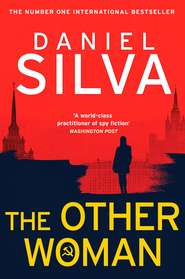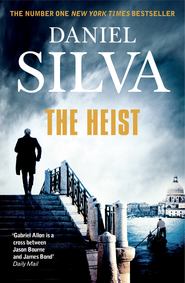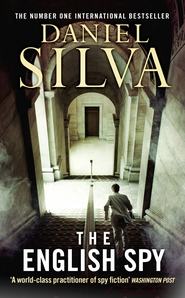По всем вопросам обращайтесь на: info@litportal.ru
(©) 2003-2024.
✖
The Fallen Angel
Настройки чтения
Размер шрифта
Высота строк
Поля
“So am I.”
The ghost seemed relieved she was no longer alone. She stood her ground for another moment as if guarding the passageway to her secrets. Then she stepped to one side and invited Gabriel and Chiara to enter.
The sitting room was a place of academic disarray, of shelves sagging beneath the weight of countless books, of end tables piled high with dog-eared files and hulking monographs. It had an air of urgency, as though its occupant had been in pursuit of something and had been struggling to meet a deadline. Paola Andreatti was right about one thing; everything in the apartment looked slightly askew, as though it had been moved and hastily put back into place. Gabriel walked over to the cluttered writing desk and switched on the lamp. Then he crouched and examined the surface of the desk in the raked lighting. In the center was a perfect rectangle, about ten inches by fifteen inches, where no dust was present. He picked up a half-drunk cup of coffee and carried it into the kitchen, where Chiara and Paola Andreatti stood before the sink finishing the last of the dishes. Neither woman spoke as he placed the cup on the counter and sat at the tiny café-style table.
“Was your sister a believer?” he asked.
“She was a devout Catholic. I’m not so sure whether she actually believed in God.” She looked up from her work at the sink. “Why do you ask?”
“She wore a cross.”
“It belonged to our mother. It was the one possession of hers that Claudia wanted. Fortunately, it was the one thing I didn’t want.”
“You don’t share your sister’s faith?”
“I’m a cardiologist, Mr. Allon. I’m a woman of science, not faith. I also believe that more evil has been carried out in the name of religion than any other force in human history. Look at the terrible fate of your own people. The Church falsely branded you as the murderers of God, and for two thousand years you’ve suffered the consequences. Now you’ve returned to the land of your birth only to find yourself locked in a war without end. Is this really what God had in mind when he made his pact with Abraham?”
“Perhaps Abraham forgot to read the fine print.”
Chiara fixed Gabriel with a reproachful stare, but Paola Andreatti managed a fleeting smile. “If you’re asking whether my sister would be reluctant to kill herself because of her religious beliefs, the answer is yes. She also regarded St. Peter’s Basilica as a sacred place that was inspired by God. Besides,” she added, “I’m a physician. I know a suicidal person when I see one. And my sister was not suicidal.”
“No trouble at work?” asked Gabriel.
“Not that she mentioned.”
“What about a man?” asked Chiara.
“Like many women in this country, my sister hadn’t managed to find an Italian man suitable for marriage or even a serious relationship. It’s one of the reasons I ended up in London. I married a proper Englishman. Then, five years later, he gave me a proper English divorce.”
She dried her hands and began returning the newly clean dishes to the cabinets. There was something mildly absurd about her actions, like watering a garden while thunder cracked in the distance, but they seemed to give her a momentary sense of peace.
“Twins are different,” she said, closing the cabinet. “We shared everything—our mother’s womb, our nursery, our clothing. You might find this rather strange, Mr. Allon, but I always assumed my sister and I would share the same coffin.”
She walked over to the refrigerator. On the door, held in place by a magnet, was a photograph of the sisters posed along the railing of a ferry. Even Gabriel, who had an artist’s appreciation of the human form, could scarcely tell one from the other.
“It was taken during a day cruise on Lake Como last August,” said Paola Andreatti. “I was recently separated from my husband. Claudia and I went alone, just the two of us. I paid, of course. Employees of the Vatican can’t afford to stay in five-star hotels. It was the best vacation I’d had in years. Claudia said all the appropriate things about my pending divorce, but I suspect she was secretly relieved. It meant she would have me to herself again.”
She opened the refrigerator, exhaled heavily, and began placing the contents in a plastic rubbish bin. “As of this moment,” she said, “several hundred million people around the world believe my sister committed suicide. But not one of them knows that Gabriel Allon, a former Israeli intelligence agent and friend of the Vatican, is now sitting at her kitchen table.”
“I’d prefer to keep it that way.”
“I’m sure the men of the Vatican would, too. Because your presence suggests they believe there’s more to my sister’s death than merely a soul in distress.”
Gabriel made no response.
“Do you believe Claudia killed herself?”
“No,” Gabriel said. “I do not believe Claudia killed herself.”
“Why not?”
He told her about the broken necklace, about the shoes, and about the perfect rectangle on her sister’s desk where no dust was present. “You weren’t the first person to come here tonight,” he said. “Others came before you. They were professionals. They took anything that might be incriminating, including your sister’s laptop computer.”
She closed the refrigerator and stared silently at the photograph on the door.
“You did notice the computer was missing, didn’t you?”
“It’s not the only thing,” she said softly.
“What else?”
“My sister never went to sleep at night without writing a few lines in her diary. She kept it on her bedside table. It’s no longer there.” Paola Andreatti looked at Gabriel for a moment without speaking. “How long will it be necessary to allow this terrible lie about my sister to persist?”
“For as long as it takes to discover the truth. But I can’t do it alone. I’m going to need your help.”
“What kind of help?”
“You can start by telling me about your sister.”
“And then?”
“We’re going to search this apartment together one more time.”
“I thought you said the men were professionals.”
“They were,” said Gabriel. “But sometimes even professionals make mistakes.”
They moved into the sitting room and settled amid Claudia’s books and papers. Paola Andreatti spoke of her sister as though she were speaking of herself. For Gabriel, it was like interviewing a corpse that had been granted the ability to speak.
“Did she use any other e-mail address besides her Vatican account?”
“Everyone at the Vatican keeps a private account. Especially the priests.”
She recited a Gmail address. Gabriel didn’t need to write it down; his uncanny ability to mimic the brushstrokes of the Old Masters was matched only by the precision of his memory. Besides, he thought, when one is pitted against professionals, it is best to behave like one.
The interview complete, they searched the apartment. Chiara and Paola Andreatti saw to the bedroom while Gabriel handled the desk. He searched now as he imagined it had been searched in the hours after Claudia’s death—drawer by drawer, file by file, page by page. Despite his thoroughness, he found nothing to indicate why anyone might want to kill her.
But the men who had come before Gabriel had indeed made one mistake; they had left the building without emptying Claudia’s mailbox. Now Gabriel withdrew the post from Chiara’s handbag and quickly flipped through it until he found a credit card bill. The charges were a glimpse into a typical Roman life, preserved forever, like archaeological debris, in the memory banks of a mainframe computer. All the expenditures appeared unremarkable except for one. Two weeks before her death, it appeared that Claudia had spent the night in a hotel in Ladispoli, a drab seaside resort just north of Rome. Gabriel had passed through the town once in another lifetime. He recalled little of the place other than mediocre restaurants and a beach the color of asphalt. He returned the bill to its envelope and sat there for several minutes, a single question turning over in his mind. Why would a woman like Claudia Andreatti spend the night in a hotel on the Italian coast, just thirty minutes from her own apartment, in the middle of winter? He could think of only two possible explanations. The first involved love. The second was the reason she was dead.
7
VATICAN CITY
THEY HELD THE FUNERAL MASS on the third day, in the Church of St. Anne. The Holy Father did not attend, but after much quiet debate, it was decided somewhere within the halls of the Apostolic Palace that the papal private secretary would officiate. Gabriel entered the church as Donati, cloaked in white vestments, led the mourners in the recitation of the Penitential Act. Paola Andreatti sat silently in the second row, her face expressionless. Her presence made Claudia’s colleagues visibly uneasy; it was as if the soul of the departed had decided to attend her own burial. At the conclusion of the mass, as she followed the casket slowly into the Via Belvedere, she passed Gabriel without a glance. A few seconds later, Donati did the same.
The restoration lab was officially closed that day, but Gabriel decided to use the opportunity to spend a few uninterrupted hours alone with the Caravaggio. Shortly after four o’clock, he received a text message from Father Mark, Donati’s assistant, asking him to come to a café just beyond the walls of the Vatican on the Borgo Pio. When Gabriel arrived, the young priest was contemplating the screen of his BlackBerry at a table near the window. Father Mark was an American from Philadelphia. He had a face like an altar boy and the eyes of someone who never lost at cards, which was why he worked for Donati.
“A gift from the monsignor,” he said, handing Gabriel a small plastic bag from the Vatican bookstore.











